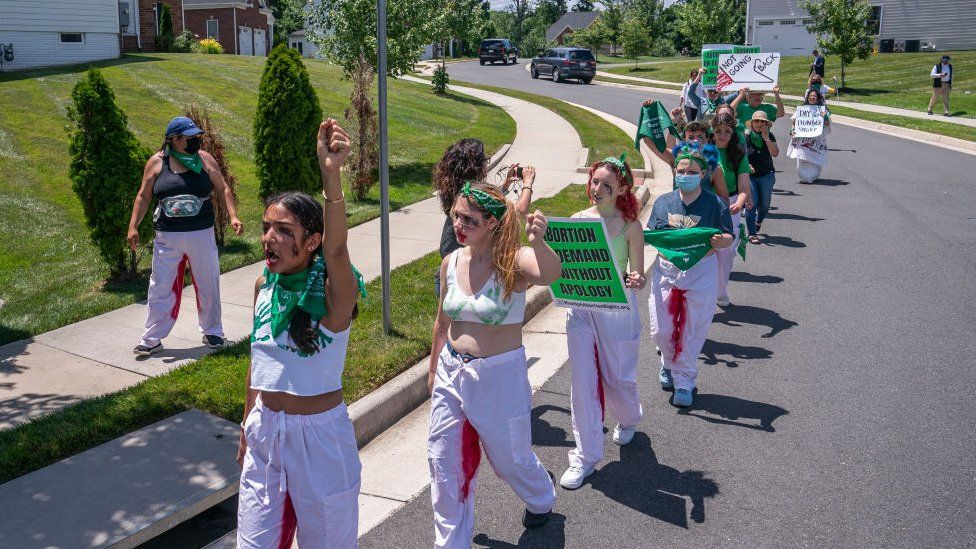
Abortion: Pressure grows on Virginia as new bans arise in the south

Abortion rights activists at a June 2022 protest in Falls Church, Virginia
By Sam Cabral
BBC News, Washington
As North and South Carolina move to tighten abortion restrictions, women seeking to terminate pregnancies in the US south may be running out of options.
As access has been severely curtailed, Virginia is poised to become the only state in the region to allow abortions after 12 weeks of pregnancy.
The latest restrictions are expected to force even more out-of-state patients to seek abortions in Virginia.
That is putting pressure on already strained in-state abortion providers.
Whole Woman’s Health, which operates two brick-and-mortar clinics and a telemedicine resource that provides abortion pills by mail, was seeing more women cross state lines to access its services even before the Supreme Court overturned the right to terminate pregnancies last June.
“It started when Texas passed its six-week ban in 2021,” said founder and CEO Amy Hagstrom Miller. “We started to see people – believe it or not – coming all the way from Texas into Virginia.”
That is a distance of about 1,200 miles (2,000km) – and the number of women arriving from other parts of the country has risen by more than 10% in the 11 months since the court’s ruling, according to Mrs Miller.
Several have come from Kentucky, Tennessee and West Virginia – all of which border Virginia and which have outlawed nearly all abortions.
In North Carolina, which borders Virginia to the south, the Republican-controlled state legislature on Tuesday overrode the Democratic governor’s veto of a bill that bans most abortions after 12 weeks of pregnancy.
The law will go into effect on 1 July.
South Carolina’s legislature – which is also Republican-controlled – is seeking to prohibit nearly all abortions after six weeks, although it is likely to face court challenges. A similar six-week ban is making its way through state courts in Florida.
More than 6,000 women from other parts of the country have phoned Whole Woman’s Health clinics since the start of the year.
In anticipation of more patients, the organisation has been working to fill a shortage of providers by bringing in new physicians and nurse practitioners from the Washington DC and Baltimore areas, and even from as far as California.
The Victorian-era anti-obscenity law used to ban abortion
Over the past year, it is also leaning more heavily on its virtual tele-health programmes and has created other resources to ease the burden of out-of-state patients, including helping them with funding.
“Almost 70% of people seeking abortions are already working parents,” Mrs Miller told the BBC. “We’ve got child-friendly waiting rooms with toys and changing tables – things that maybe we didn’t need to think about as much when we were just serving folks locally.”
“People are very confused. They’re uncertain about their rights, they’re uncertain about where they can get an abortion,” she added. “We’re doing our best to try to get clear information to people and help as many as we can.”
The expected surge in women seeking an abortion in Virginia is perhaps even more concerning for Planned Parenthood, which operates six clinics across the state and anticipates thousands of additional patients will seek its services in the coming months.
Jamie Lockhart, executive director of Planned Parenthood Advocates for Virginia, said abortion bans in neighbouring states will have “a ripple effect” on her state.
“This influx of patients will lead to longer wait times for Virginians,” she said.
“These providers of abortion care also provide a whole range of sexual and reproductive healthcare as well as primary care,” she added. “So when there’s an increased need for abortion access, it’s also going to have implications for other healthcare that they provide.”
Virginia currently allows abortions in the first and second trimesters – or, more precisely, up to 26 weeks and six days of pregnancy – while also allowing them in the third trimester if at least three doctors certify that the woman’s health is at risk.
Texas abortion law: ‘I waited for my daughter to die so I wouldn’t die’
In January, Democrats in the state legislature blocked a 15-week abortion ban proposed by Republican Governor Glenn Youngkin.
Two-thirds of Virginians in a Washington Post-Schar School poll in April said they opposed tightening access to abortion.
The state’s residents should recognise, however, that they are “one election away” from having restrictions similar to those in North Carolina, Ms Lockhart said.
After the Supreme Court decision, abortions in North Carolina soared by nearly 40% – the single biggest percentage increase in any state – as women from the region saw access to the procedure in their own states curbed.
But after a state representative switched from the Democratic party to the Republican party last month, it handed Republicans the veto-proof majority they needed to push through their six-week abortion proposal over the objections of Governor Roy Cooper, a Democrat.
By contrast, Governor Youngkin in Virginia has vowed to “happily and gleefully” sign anti-abortion legislation sent to his desk.
While his previous effort was thwarted by an ultra-slim Democratic majority in the state Senate, every seat in the legislature will be on the ballot this November and, if the chamber flips to Republican control, Mr Youngkin will get his chance.
Source: https://www.bbc.co.uk/news/world-us-canada-65638728?at_medium=RSS&at_campaign=KARANGA















